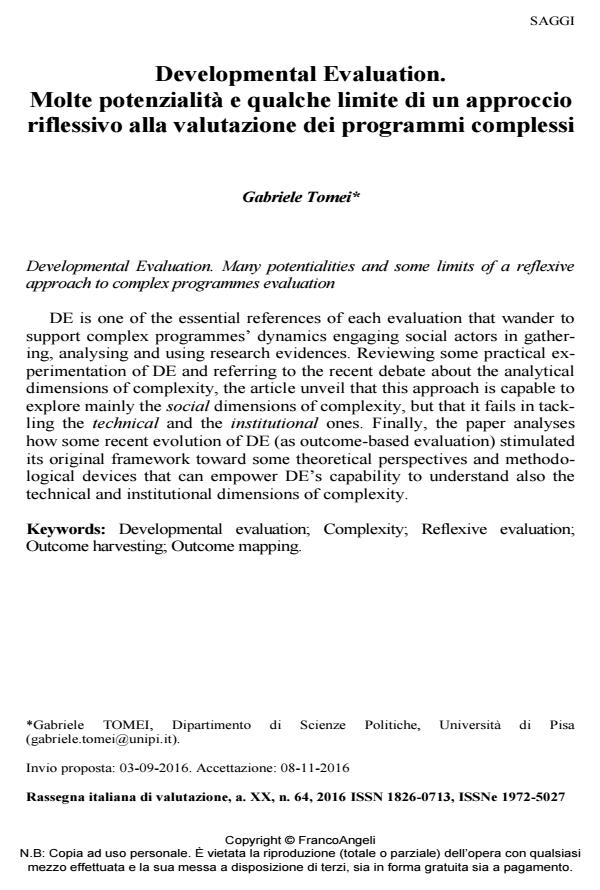Developmental Evaluation. Many potentialities and some limits of a reflexive approach to complex programmes evaluation
Journal title RIV Rassegna Italiana di Valutazione
Author/s Gabriele Tomei
Publishing Year 2017 Issue 2016/64
Language Italian Pages 23 P. 132-154 File size 1032 KB
DOI 10.3280/RIV2016-064008
DOI is like a bar code for intellectual property: to have more infomation
click here
Below, you can see the article first page
If you want to buy this article in PDF format, you can do it, following the instructions to buy download credits

FrancoAngeli is member of Publishers International Linking Association, Inc (PILA), a not-for-profit association which run the CrossRef service enabling links to and from online scholarly content.
DE is one of the essential references of each evaluation that wander to support complex programmes’ dynamics engaging social actors in gathering, analysing and using research evidences. Reviewing some practical experimentation of DE and referring to the recent debate about the analytical dimensions of complexity, the article unveil that this approach is capable to explore only the social dimensions of complexity, but that it fails in tackling the technical and the institutional ones. Finally, the paper analyses how some recent evolution of DE (as outcome-based evaluation) introduced in its original framework some theoretical perspectives and methodological devices that can empower DE’s capability to understand also the technical and institutional dimensions of complexity.
Keywords: Developmental Evaluation; Complexity; Reflexive evaluation; Outcome Harvesting; Outcome Mapping
- Arkesteijn M., van Mierlo B., e Leeuwis C. (2015), “The need for reflexive evaluation approaches in development cooperation”, in: Evaluation, 21(1), 99-115.
- Bertin G. (2011), Con-sensus method. Ricerca sociale e costruzione di senso, FrancoAngeli, Milano
- Boyd A., Geerling T., Gregory W. J., Kagan C., Midgley G., Murray P. e Walsh, M. P. (2007), “Systemic evaluation: a participative, multi-method approach”, in: Journal of the Operational Research Society, 58(10), 1306-1320.
- Charmaz K. (2006), Constructing Grounded Theory. A Practical Guide through Qualitative Analysis, Sage, London.
- Davies R. and Dart J. (2005), The ‘Most Significant Change’ Technique. A Guide to Its Use, mimeog., -- (scaricabile al link http://www.mande.co.uk/docs/MSCGuide.pdf).
- Earl S., Carden F., Smutylo T. (2001), Outcome Mapping. Building Learning and Reflection into Development Programs, IRDC, Ottawa -- (scaricabile al link: http://www.outcomemapping.ca/download/OM_English_final.pdf).
- Gerrits L., e Verweij S. (2015), “Taking stock of complexity in evaluation: A discussion of three recent publications”, in: Evaluation, 21(4), 481-491.
- Giddens A. (1994), Le conseguenze della modernità. Fiducia e rischio, sicurezza e pericolo, Il Mulino, Bologna.
- Giddens, A. (1990), La costituzione della società: lineamenti di teoria della strutturazione, Edizioni di Comunità, Roma.
- Guba E.G. e Lincoln Y.S. (1987), Forth Generation Evaluation. In: Palumbo D.J. (ed.), The Politics of Program Evaluation, Sage, Thousand Oaks.
- Leonard S. N., Fitzgerald R. N. e Riordan G. (2016), “Using developmental evaluation as a design thinking tool for curriculum innovation in professional higher education”, in: Higher Education Research & Development, 35(2), 309-321.
- Mayne J. (2011), “Contribution Analysis: Addressing Cause and Effect”, in: Forss K., Marra M., Schwartz R. (eds.) (2011), Evaluating the Complex. Attribution, Contribution and Beyond, Transaction Publishers, Somerset, NJ.
- Mintzberg H. (2007), Tracking Strategies: Toward a General Theory, Oxford University Press, Oxford.
- Moro G. (2005), La valutazione delle politiche pubbliche, Carocci, Roma.
- Patton, M.Q. (1994), “Developmental Evaluation”, in: Evaluation Practice, 15(3).
- Patton, M.Q. (2008), Utilization-focused evaluation, Sage Publication, London-New Delhi.
- Patton, M.Q. (2011), Developmental Evaluation: Applying Complexity Concepts to Enhance Innovation and Use, Guilford Press, New York-London.
- Pawson R., Tilley N. (1997), Realistic Evaluation, Sage Publication, London-New Delhi.
- Ramirez R., Kora G. e Shephard D. (2015), “Utilization Focused Developmental Evaluation: Learning Through Practice”, in: Journal of MultiDisciplinary Evaluation, 11(24), 37-53.
- Rogers P. J. (2008), Using Programme Theory to Evaluate Complicated and Complex Aspects of Interventions, in: Evaluation, January, vol. 14, 1Stame N. (2016), Valutazione pluralista, FrancoAngeli, Milano.
- Stame N. (2001), “Tre approcci principali alla valutazione: distinguere e combinare”, in: Palumbo M., Il processo di valutazione. Decidere, programmare, valutare, Franco Angeli, Milano.
- Stame N. (2016), Valutazione pluralista, FrancoAngeli, Milano.
- Strauss A. e Corbin J. (1990), Basic of Qualitative Research: Grounded Theory Procedures and Techniques, Sage, Newbury Park.
- Tarozzi M. (2008), Che cos’è la grounded theory, Carocci, Roma.
- Tomei G. (2010), “Come valutare la qualità delle politiche per la cittadinanza? Due domande (teorico-metodologiche) ed un tentativo (empirico) di risposta”, in: Rivista trimestrale di Scienza dell’Amministrazione, vol.4.
- Tomei G. (2016), Valutare gli outcome dei programmi complessi. Approcci, metodologie, tecniche, FrancoAngeli, Milano.
- Tomei, G. (2004), Valutazione partecipata della qualità. Il cittadino utente nel giudizio sugli interventi di politica e servizio sociale, FrancoAngeli, Milano.
- Ulrich W. e Reynolds M. (2010), “Critical systems heuristics”, in: Systems approaches to managing change: A practical guide, Springer, London.
- Van Winkelen C. (2016) “Using developmental evaluation methods with communities of practice”, in: The Learning Organization, 23(2/3).
- Weiss C. (1998), Evaluation: Methods for Studying Programs and Policies, Prentice Hall, Englewood Cliffs NY.
- Wilson-Grau R. and Britt H. (2013), Outcome Harvesting, Ford Foundation MENA, Cairo -- (scaricabile al link: http://www.outcomemapping.ca/resource/outcome-harvesting).
- Zimmerman B., Lindberg C., e Plsek P. (1998), Edgeware: Complexity Resources for Healthcare Leaders, VHA Publishing, Irving, TX.
- Quale valutazione per il contrasto della povertà educativa estrema? Riflessioni sul Progetto per l'Inclusione dei Bambini Rom, Sinti e Camminanti nella Città di Napoli Gabriele Tomei, Valentina Ferrucci, in RIV Rassegna Italiana di Valutazione 80/2022 pp.29
DOI: 10.3280/RIV2021-080003
Gabriele Tomei, Developmental Evaluation. Molte potenzialità e qualche limite di un approccio riflessivo alla valutazione dei programmi complessi in "RIV Rassegna Italiana di Valutazione" 64/2016, pp 132-154, DOI: 10.3280/RIV2016-064008